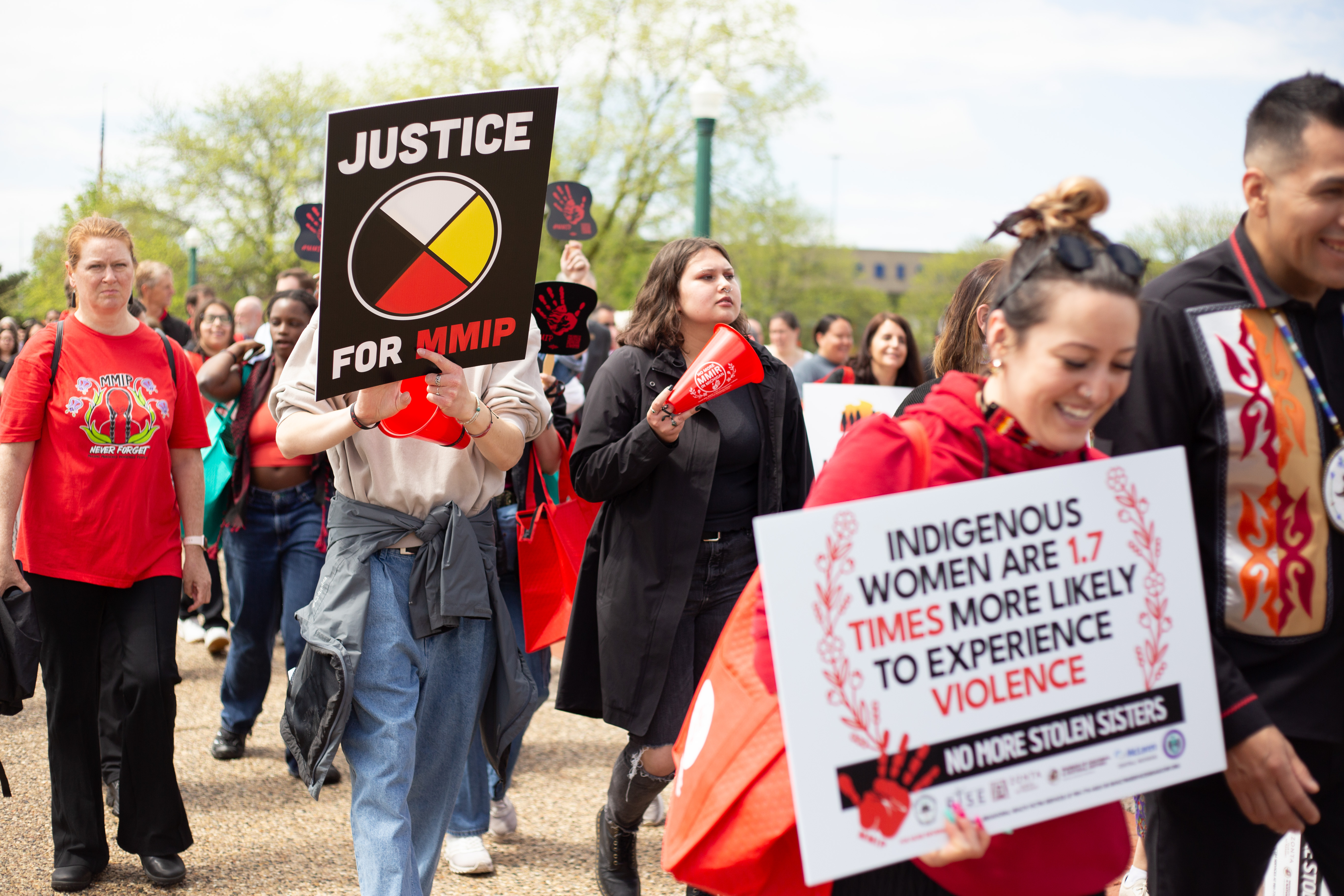
- Details
- By Elyse Wild
The gathering, organized by the state's MMIP task force, was one of hundreds that took place around Indian Country for National MMIP Awareness Day, proclaimed by President Joe Biden as Sunday, May 5. Many attendees wore red clothing and donned red hand prints on their faces. Red is the official color commemorating MMIP, drawn from the common Native belief that red is the only color spirits can see.
The event began at noon with a grand entrance from representatives of Michigan's 12 federally recognized tribes, followed by a water ceremony. Speakers included filmmaker Valerie Red-Horse Mohl (Cherokee); Uniting Three Fires Against Violence Project Director Sandra Pilgrim Lewis (Oglala Lakota Sioux); and Chief Judge of the Nottawaseppi Huron Band of the Potawatomi Tribal Court Melissa Pope. Representatives from regional chapters of the RedRum Motorcycle Club also spoke. Anong the speakers were Michigan Gov. Gretchen Whitmer, Congresswoman Hillary Scholten and U.S. Attorney for the Western District of Michigan Mark Totten.
Speakers addressed the factors driving the crisis, marked by the disproportionally high number of cold cases involving Indigenous people who go missing or are murdered.
The MMIP crisis is prevalent across the United States, with Indigenous peoples being murderedat a rate ten times the national average. Homicide is the fifth-leading cause of death for Native women 25-34, according to the Bureau of Indian Affairs.
Advocates say jurisdictional confusion, systemic limitations, and apathy leave many cases unsolved. Devastated families in Native communities are often left to look for their loved ones alone.
In addressing the crowd, Whitmer underscored that lawmakers need to pay attention and take action to mitigate the crisis.
"We must remember that these issues are not unsolvable," Whitmer told the crowd. If we act, we can and will save lives."
She noted that Michigan is one of six states in a national pilot program launched in 2020 to address community response plans to MMIP cases.
Pope closed out the speaker portion of the event with a powerful call to Indigenous people and allies to become educated on the enduring impact of federal assimilation policies and intersecting disparities that culminate in the MMIP Crisis.
“The needs surrounding missing and murdered women and Indigenous people are long-standing issues connected to this country’s history of assimilation policies,” Pope said. “We need allies in this work, and we need every advocate to remember the historical trauma and suffering of Indigenous people throughout the U.S., including Alaska and Hawaii.”
The event concluded with a mile-long march through downtown Grand Rapids.
National MMIP Awareness was first recognized in 2017, prompted by a resolution introduced by Montana Senators Steve Daines and Jon Tester. The date of May 5 was selected to honor the birthday of Hanna Harris, a 21-year-old member of the Northern Cheyenne tribe who went missing on July 4, 2013. Events honoring the day will continue to take place across Indian Country throughout this week.
https://nativenewsonline.net/currents/hundreds-gather-in-grand-rapids-mich-for-mmip-awareness-event#sigProId1fae7945b0
More Stories Like This
Native News Weekly (August 25, 2024): D.C. BriefsNavajo Nation Mourns the Passing of Former Vice President Rex Lee Jim
Deb Haaland Earns Endorsement From Communications Workers of America Local 7076
University Soccer Standout Leads by Example
Two Native Americans Named to Democratic Congressional Campaign Committee's“Red to Blue” Program
Help us defend tribal sovereignty.
At Native News Online, our mission is rooted in telling the stories that strengthen sovereignty and uplift Indigenous voices — not just at year’s end, but every single day.
Because of your generosity last year, we were able to keep our reporters on the ground in tribal communities, at national gatherings and in the halls of Congress — covering the issues that matter most to Indian Country: sovereignty, culture, education, health and economic opportunity.
That support sustained us through a tough year in 2025. Now, as we look to the year ahead, we need your help right now to ensure warrior journalism remains strong — reporting that defends tribal sovereignty, amplifies Native truth, and holds power accountable.
 The stakes couldn't be higher. Your support keeps Native voices heard, Native stories told and Native sovereignty defended.
The stakes couldn't be higher. Your support keeps Native voices heard, Native stories told and Native sovereignty defended.
Stand with Warrior Journalism today.
Levi Rickert (Potawatomi), Editor & Publisher



